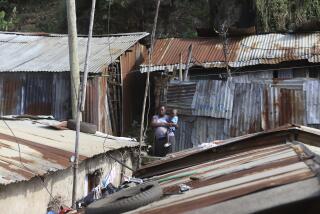Idris Elba plans to move to Africa to boost film industry in Ghana, Tanzania and beyond

Idris Elba is no absentee boss.
As part of his ongoing effort to develop Africa’s film industry, the Golden Globe-winning actor plans to build film studios in Ghana and Tanzania over the next decade. It’s a task he says he can’t accomplish with a London postcode.
“I’m here to bolster the film industry — that is a 10-year process,” Elba told the BBC in an interview published Tuesday. “I won’t be able to do that from overseas. I need to be in-country, on the continent.”
The “Luther” star said he plans to make the move “in the next five, 10 years, God willing” and will bounce around different locales — Accra in Ghana, Freetown in Sierra Leone, Zanzibar in Tanzania — in an effort to “go where they’re telling stories.”
Idris Elba revealed that he’s in therapy to address being an ‘absolute workaholic’ and spoke on some of the ‘unhealthy habits’ he needs to work on.
Elba’s father was from Sierra Leone and his mother was from Ghana.
Tanzanian authorities in August finalized the allocation of a nearly 200-acre parcel of land in Zanzibar to Elba, who plans to build a film studio there with the working title West African Studios. The studio would be comparable to any in “Hollywood, Nollywood or Bollywood” and could become “Zollywood,” the country’s investment minister Shariff Ali Shariff said at the time.
“We’ve been working on this for three or four years to raise a plan that puts a facility at the center of African filmmaking,” Elba told the Ghanaian press in February 2023, noting that the existing facilities are “lacking.”
A 2022 UNESCO report said that despite “significant growth in production” — the Nigerian film industry alone produces around 2,500 movies annually, with total revenue estimates in the hundreds of millions of dollars — African film production is hindered by issues such as piracy, insubstantial training opportunities and a lack of official film institutions.
USC’s School of Cinematic Arts hosted a cohort of African filmmakers this summer as part of a State Department program for film diplomacy.
“This sector is a soft power, not just across Ghana but across Africa,” Elba told the BBC, adding that with the right resources and infrastructure, African filmmakers can challenge the colonial narratives about the continent offered by Western media.
“If you watch any film or anything that has got to do with Africa, all you’re going to see is trauma, how we were slaves, how we were colonized, how it’s just war,” Elba said, “and when you come to Africa, you will realize that it’s not true.”
He continued: “It’s really important that we own those stories of our tradition, of our culture, of our languages, of the differences between one language and another. The world doesn’t know that.”
Outside of the entertainment sector, Elba also has plans to develop an “eco-city” on Sherbro Island, a tropical region off the southwestern coast of Sierra Leone — where his father was born. The project is led by Elba’s childhood friend Siaka Stevens, the grandson of a former Sierra Leonean prime minister of the same name, and intends to bring wind-powered renewable electricity to that country for the first time.
“It’s a dream, you know, but I work in the make-believe business,” Elba told the BBC in March. “It’s about being self-reliant, it’s about bringing an economy that feeds itself and has growth potential. I’m very keen to reframe the way Africa is viewed.”
More to Read
Only good movies
Get the Indie Focus newsletter, Mark Olsen's weekly guide to the world of cinema.
You may occasionally receive promotional content from the Los Angeles Times.













